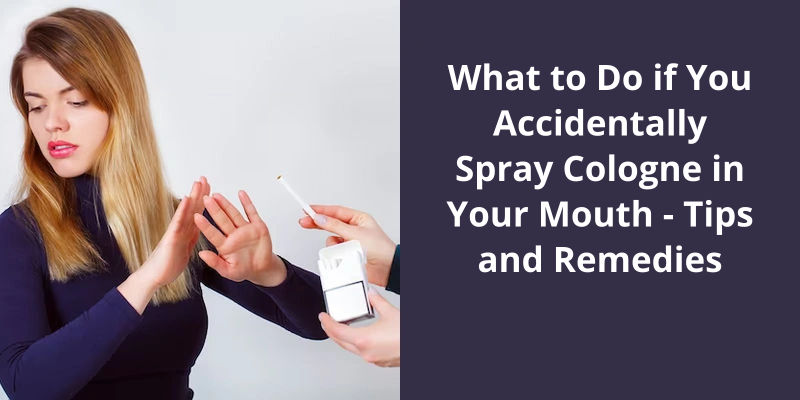If you accidentally spray cologne in your mouth, the first step is not to panic but quickly spit it out and rinse your mouth multiple times with warm water to get rid of as much of it as possible. After rinsing, drinking milk can further help because the fat in it can bind with and eliminate some chemicals. Brush your teeth and use mouthwash to clean your mouth thoroughly. You could experience a burning sensation, unpleasant taste, or even nausea, but drinking lots of water can help alleviate these symptoms. If your condition worsens or persists for a longer period, getting medical help right away is advised since cologne contains chemicals that are not safe for internal use.

What Happens When You Put Perfume in Your Mouth and How Can You Fix It?
If someone accidentally sprays perfume in their mouth, they may experience a range of unpleasant sensations. These could include a strong burning sensation on the tongue, throat, and mouth, as well as a feeling of dryness and numbness. Other symptoms may include headaches, dizziness, and even nausea in some cases. Depending on the amount of perfume that enters the mouth, the severity of these symptoms can vary.
To help alleviate the effects of accidentally ingesting perfume, it’s important to rinse out the mouth thoroughly with warm water. This can help to dilute the concentration of the perfume and wash away any remaining chemicals. Another good solution is to take small sips of water, which can help to rehydrate the mouth and soothe any burning sensations.
If the symptoms persist or worsen, it may be necessary to seek professional medical help. In some cases, a healthcare provider may need to administer an antidote or other treatment to help counteract the effects of the perfume. In other cases, the individual may simply need to rest and wait for the symptoms to subside on their own.
Overall, accidental ingestion of perfume is a serious matter that should be taken seriously. It’s important to act quickly and effectively to help alleviate the symptoms and avoid any potential long-term effects. By following the steps outlined above, individuals can help to mitigate the risks of perfume ingestion and protect their health and well-being.
The Differences Between Natural and Synthetic Fragrances in Perfumes and Their Potential Effects on the Body
- Natural fragrances are extracted from plants, flowers, and other natural sources.
- Synthetic fragrances are created in a lab using chemicals.
- Natural fragrances are generally considered safer for the body as they’re less likely to cause allergic reactions or irritation.
- Synthetic fragrances may contain harmful chemicals that can cause irritation, skin sensitivities, and environmental harm.
- Natural fragrances tend to have a more subtle and complex scent profile, while synthetic fragrances can have a stronger, more predictable scent.
- Choosing natural fragrances can be a more sustainable and eco-friendly choice, as they involve less processing and use of chemicals.
- Overall, it’s important to be mindful of the ingredients in your perfumes and choose fragrances that align with your values and prioritize your health and well-being.
It’s important to apply cologne correctly to ensure that the scent isn’t overpowering and that your skin remains healthy. While applying cologne on pulse points is recommended, some may wonder if it’s safe to apply cologne on the face as well. Let’s explore this topic further.
Is It OK to Spray Cologne on Your Face?
Some people may think that spraying cologne on their face is a good idea, but it isn’t recommended by professionals. Cologne contains alcohol and other chemicals that can irritate and dry out your skin. It’s best to apply cologne on pulse points such as wrists, neck, and chest, where it can be easily diffused and last longer.
The facial skin is delicate, and using cologne on it can cause redness, dryness, and even breakouts. It’s also not recommended to spray cologne on broken or irritated skin.
These areas generate heat and help to diffuse the scent, making it last longer. Spraying cologne on clothes is also an option, but keep in mind that it may stain the fabric or change the fragrances scent.
When using cologne, it’s essential to be aware of how much you’re using. Overusing cologne can be overwhelming and even offensive to some people. A little goes a long way, and you should aim to apply just enough to enhance your natural scent, not overwhelm it.
In addition to the potential health risks, spraying perfume on your tongue would be an unpleasant experience. Instead, it’s important to consider the proper application of fragrance to ensure both safety and enjoyment. With that said, let’s explore some alternative methods for experiencing scents and expanding your olfactory palette.
Can You Spray Cologne on Your Tongue?
Spraying cologne on your tongue isn’t only ill-advised, but it’s also potentially hazardous to your health. The fragrance may also enter the digestive system, leading to further complications. Therefore, it’s always better to avoid such practices and stick to the proper use of perfume.
The strong odor of the fragrance can overpower the natural flavors in the mouth, making it difficult to taste food and beverages properly. This can be particularly problematic for those who work in the food and beverage industry, as a mistake in taste can ruin an entire recipe. Additionally, excessive use of cologne can leave a bitter taste in the mouth, which can be unpleasant and harmful to ones health.
Using cologne inappropriately not only affects the wearer, but it can also have a negative impact on those around them. When sprayed directly into the mouth, perfume particles can enter the air and irritate the respiratory system of others. This can cause problems for those who suffer from allergies or breathing difficulties.
There are alternative ways to enjoy the scent of cologne without putting ones health at risk. One can choose to spray the fragrance on clothes or non-sensitive areas of the skin, such as the wrists, neck or chest. This not only reduces the risk of irritation but also provides a longer-lasting scent throughout the day. Additionally, using a cologne made from natural ingredients can also mitigate some of the risks associated with synthetic chemicals.
It can cause damage to the sensitive tissues in the mouth and respiratory system and affect the taste buds as well. One should always use perfume with care and follow the manufacturers instructions for safe use. Additionally, it’s better to choose natural fragrances and avoid synthetic chemicals whenever possible. By being mindful of these practices, one can enjoy the benefits of a pleasant scent without any of the risks.
It’s important to take immediate action if you or someone you know has accidentally swallowed cologne. The severity of symptoms depends on the amount ingested and how quickly medical attention is received. Symptoms such as drunkenness, breathing difficulties, seizures, or loss of consciousness can occur in cases of cologne poisoning. In this article, we will explore the potential dangers of ingesting cologne and what steps to take if it does happen.
Am I Going to Be OK if I Sprayed Cologne in My Mouth?
Thus, it’s essential to seek emergency medical attention immediately if cologne is accidentally ingested. The severity of the symptoms largely depends on the type of cologne and it’s chemical composition. Some ingredients in cologne, such as alcohol and essential oils, can be particularly harmful when ingested, causing nausea, vomiting, and dizziness.
To avoid cologne poisoning, it’s crucial to keep cologne bottles out of reach of children and pets. It’s also essential to avoid spraying cologne directly onto the face or mouth. If this is unavoidable, make sure to hold your breath while spraying and wait for the cologne to dry before opening your mouth or breathing in.
Are There Any Alternative Options to Spray-on Cologne That May Be Safer?
- Cologne sticks or solids
- Roll-on cologne
- Perfume oil
- Cologne wipes
- Cologne powders
Source: Cologne poisoning Information Mount Sinai – New York
If you’ve accidentally applied too much perfume, you might find it overwhelming and need to neutralize it quickly. While conventional methods like soap and water may not always work, there’s a surprising remedy that works wonders – alcohol. According to experts, the best way to counter the overpowering scent is by using rubbing alcohol, making the process of eliminating perfume residue a breeze. To learn more about this quick and easy fix for perfume mishaps, keep reading.
How Do You Get Perfume Off Quickly?
Perfume has been a popular form of fragrance for centuries, used for it’s many benefits, including enhancing mood and improving self-confidence. However, sometimes the application of perfume can be too strong or accidentally overdone, leading to discomfort or even allergic reactions. In these cases, it’s important to know how to get perfume off quickly and effectively.
Fortunately, there’s a simple and effective solution that involves the use of rubbing alcohol. By simply dipping a cotton ball in rubbing alcohol and dabbing it on the affected area, excess perfume can quickly and easily be neutralized. This method is particularly effective for those who’re sensitive or allergic to perfume, preventing further discomfort and irritation.
It’s important to use only a small amount of rubbing alcohol, particularly on sensitive areas such as the face or neck.
Mixing a small amount of baking soda with water to form a paste and applying it onto the affected area can help to neutralize the fragrance quickly. This method is particularly effective for those who prefer a more natural approach, as baking soda is a common household item that many people have on hand.
This simple and easy solution can help to neutralize the fragrance quickly and without causing further irritation or discomfort.
Are There Any Perfumes Specifically Designed for Those With Sensitive Skin or Allergies?
- Floris London Sensitive Eau de Parfum
- L’Occitane Lavender Eau de Cologne
- The Body Shop White Musk Eau de Parfum
- Joya Composition No. 1 Parfum Oil
- Vanicream Z-Bar Medicated Cleansing Bar
- PureGrace Eau de Toilette by Philosophy
- Burdock & Co. Eau de Parfum by Ayala Moriel Parfums
- Vera Wang Embrace French Lavender Eau de Toilette
Conclusion
It's important to act quickly and seek help from your local emergency services or poison control center if you or someone you know experiences this exposure. Remember to handle fragrances and other substances with care, and always keep them out of reach of children and pets to prevent accidental exposure. Taking these precautions can help ensure the safety and well-being of yourself, your loved ones, and those around you.





